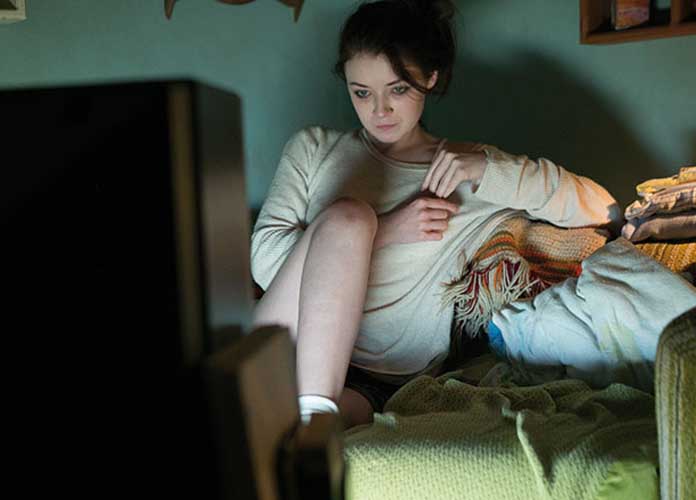‘Emelie’ Movie Review: Thrilling, But With Obvious Intention

3.5/5
Emelie could be categorized under the coming-of-age umbrella of movies, although in terms of genre one really has to throw it under thriller. The darkness of the film looms right under the surface for most of the film, so the audience knows that it’s there and can suspect what is going to happen but is gripping their chairs in suspense so that when the sinister nature of the film is officially revealed, it’s absolutely chilling. Michael Thelin directs masterfully, with the camera always the eerie observer and Sarah Bolger gives an unforgettable performance along side the kids Joshua Rush, Carly Adams and Samuel Hale. But the acting and the camera work does not entirely make up for the fact that the plot asks the audience to suspend some of their logic and belief to fully appreciate the film.
‘Emelie’ Movie Review
Without spoiling too much, as the enjoyment of the film is truly the suspense which seeps into the movie quite skillfully, the most important thing to note about the plot is that from the beginning there is obviously something wrong. The just-noticeable contemplation behind every one of Bolger’s lines and the intrusive camera work makes that much clear. The way Richard Raymond Harry Herbeck has set things up, the actual problem of the situation is a bit predictable. Emelie, although we don’t know her name initially, is an impostor of Anna. This is no spoiler since within the first few minutes of the film the audience witnesses Anna being kidnapped. Herbeck leaves it up to the audience to put the pieces together, but it isn’t too hard.
Anna’s interactions with the children grow increasingly inappropriate and Bolger makes sure that she is clearly twisted and dangerous even when her identity is not revealed. In terms of manipulating our emotions, Thelin successfully has the audience rooting for Jacob (Rush) to figure out the truth and take charge as the opening scenes of the movie suggests he will. But, when the background of Emelie is actually revealed, Anna’s previous actions stop making sense. Many of the creepier parts of the build up seem like they’re there just for shock value and aren’t a logical result of Emelie’s revealed backstory. Emelie’s ultimate goal is to find herself a “cubby” and to become a mother again, yet her methods of figuring out which child she wants is by attacking their innocence, exposing them to great violence, indecency, and allowing general deviance. Furthermore, as the film progresses and Jacob, as the oldest, finally realizes that there’s something wrong with “Anna,” he doesn’t take any of the action any 11-year-old child would think to do. Every kid learns to call 911 when something’s wrong in Kindergarten, there’s no reason why Jacob wouldn’t know to do this.
The genuine acting of the children, from their squeals to their shrieks, and the enticing performance delivered by Bolger does make the movie enjoyable to watch. But as the stakes get higher as the movie progresses, between the inclusion of the strange man watching the Thompson couple who never really gets explained, and the alternative suspenseful music that comes in every once a while, it’s hard to ignore how much the movie is pushing the audience to be scared. The climax of the film is impressive. The way Jacob just barely outsmarts Emelie is absolutely thrilling (albeit a bit hard to believe). But the final resolution is quite unsatisfying, and while the camera work is aesthetically pleasing and fitting, the final product of the film is altogether imperfect.
For a first work, Thelin’s film shows great potential. Clearly his strongest point is where he has the most experience: his film editing and camera work. The way he decides to deliver this story is impressive. But the story itself, whether because of him or Herbeck’s work, asks the audience to believe too much and while thrilling in the moment, the movie will not leave any lasting impression, with a stranger danger message that reinforces emergency practices that most kids, but apparently not these kids, learned in elementary school. The movie emanates urgency, as in, the urgency to prove that it is capable of convincing and scaring us, which is exactly what undermines it.
RELATED ARTICLES
Get the most-revealing celebrity conversations with the uInterview podcast!



 Click here for the Oscars 2016: Best Dressed Photos Slideshow
Click here for the Oscars 2016: Best Dressed Photos Slideshow



Leave a comment